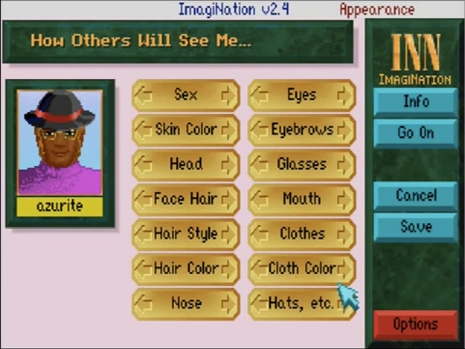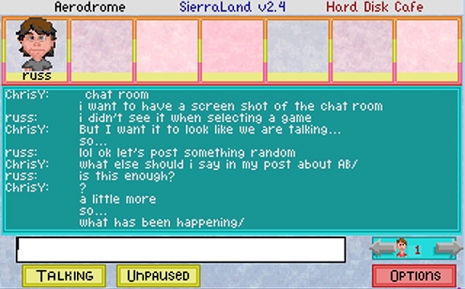
Before the “World Wide Web” became a thing and only AOL and CompuServe existed for games and chat rooms, Sierra On-line (the software company responsible for such classic adventure games as King’s Quest, Space Quest, Police Quest, and Leisure Suit Larry) developed a highly imaginative and groundbreaking environment known as The ImagiNation Network. Initially launched on May 6th, 1991 as “The Sierra Network,” this friendly, graphics-heavy interface was so simple, advertising promised that even your grandmother would find it easy to “play games, make friends and have fun.” As a teenage computer geek I was instantly hooked after being introduced by my friend Brad Warner and spent hundreds of hours using the service: running up my parents credit card bill, holding up my families landline for several hours at a time, and experimenting with fake profiles when the internet was so new that you could effortlessly fool just about anybody.
Before entering ImagiNation you’d use the FaceMaker to create your appearance choosing your skin color, facial features, glasses, clothes, and hairstyle. There were enough variables built in to create over 84 million unique personas. Then you’d walk through the virtual gates and let the fun begin: Red Baron, Mini Golf, Paintball, or Boogers in SierraLand. Gambling at the casino and exchanging lewd late night talk in LarryLand (for adults only), or slaying dragons with strangers in MedievaLand. Before anybody had heard of an email address there was a post office where you could purchase “Sierra Stamps” and send messages to other users.
Through a alternative music chatroom, I befriended a cool 13-year-old Korean girl from Houston named Judy Suh who had purple hair and owned an electric guitar. We both had tickets to see the Smashing Pumpkins headline Lollapalooza ‘94 in our respective cities that summer and agreed to share our photos from the concert. Technology had yet to find a way to share photos on the internet so we made photocopies at Kinko’s and snail mailed them to each other.

In 1995 Judy suddenly disappeared from the ImagiNation Network without a trace, a few weeks later I found out that her parents banned her from using the service after running up their credit card bill. At that time the pricing structure was incredibly expensive: $9.95 per month for only 4 hours plus $3.50 for each additional hour, or $120 a month for unlimited time. Shortly after that my parents also banned me from the service because I was using their dial-up modem and holding up our six person household landline. Friends and family members complained that they received a busy signal over and over for hours and were furious when they couldn’t get through.
Heartbroken, and not yet ready to give up my addiction I took to desperate measures to get back on-line. I went over to Brad Warner’s house with a floppy disc, found the directory where his password file was stored and successfully copied it into the same directory on my computer enabling me to sign onto ImagiNation with Brad’s account. This illegal and back-stabbing act gave me so much confidence that soon I wanted to know what else I could get away with. I began secretly signing on late at night after my parents went to bed. Using the FaceMaker to create a new persona, I started posing as Smashing Pumpkins frontman, Billy Corgan. I had read every Alternative Press, SPIN, and Melody Maker interview that had been published up until that point and felt strongly that I knew enough about Billy Corgan that I could convince people that I was him. The April 1994 Rolling Stone cover story I purchased at Sam Goody proved to be a particularly detailed profile and helped me understand Billy’s troubled childhood and upbringing in a time before background information on celebrities was easily accessible on websites like Wikipedia. I was successful in fooling dozens of fans: answering questions from growing up in Glendale Heights, Illinois, to D’arcy Wretzky’s sisters photography on Smashing Pumpkins single covers, to dispelling rumors that I played the little brother on the TV show Small Wonder. After about a week I was called out for falsely claiming that the Mike Mills who played piano on the song “Soma” off the album Siamese Dream was not the same guy as the bassist from R.E.M. My cover was blown.

Soon after I was outed as an imposter by the ImagiNation community I received a call from Brad who wanted to know why there was a message from Chris Williams in his virtual Post Office box. I had forgotten that I reached out to Sierra On-Line founders Ken & Roberta Williams’ son Chris (also 15-years-old) on the network, totally not expecting him to reply. I confessed to Brad that I had stolen his password and I had been signing on under his account. That was the end of our friendship and the last time I ever used the service. In 1996 ImagiNation was purchased and then ultimately shut down forever by America Online. In 2007 there was a brief attempt to revive ImagiNation through reverse engineering and use of DOSBox, but there wasn’t enough interest in the emulator for it to take off. One fan on the “Return of Talking Time” message board, however, fondly remembered his experience on ImagiNation over 20 years later:
“I had a ridiculous experience with ImagiNation Network when I was 14. I was spending the night at my friend’s house, and I brought the free ImagiNation install disk with me. After his parents went to bed, we got his mom’s credit card from her purse and used it to create an account. (IIRC, you were given a certain number of free hours to try it out, but you had to provide credit card info to get started). We tooled around for a bit, and eventually ended up in one of the chat areas. Somehow or another we started chatting with a guy who had us 100% convinced that he was Billy Corgan of Smashing Pumpkins. Seriously. We weren’t dumb kids, but holy crap does that sound profoundly moronic in hindsight. Anyhow, we stayed up all night talking to Billy C, and ended up surpassing our free trial. When the credit card bill came later that month, my friend had to fess up to his mom. She wasn’t buying the Billy Corgan story, and I was never allowed to spend the night at his house again.”
More after the jump…








